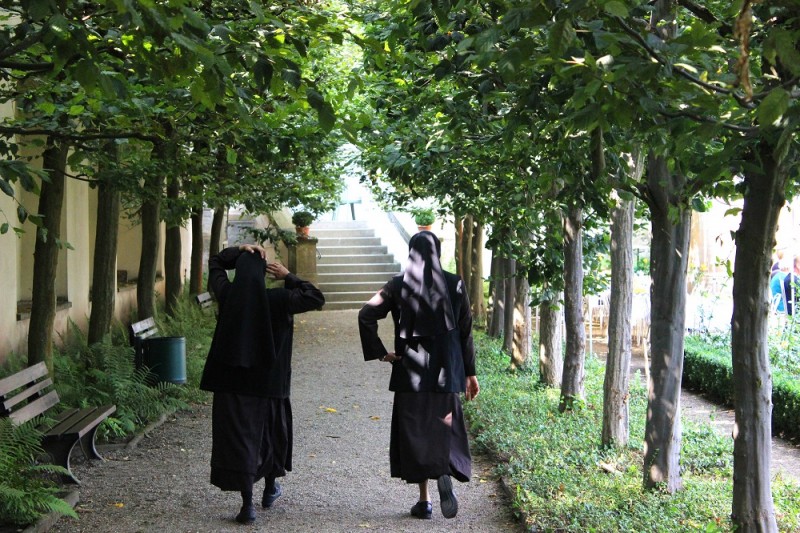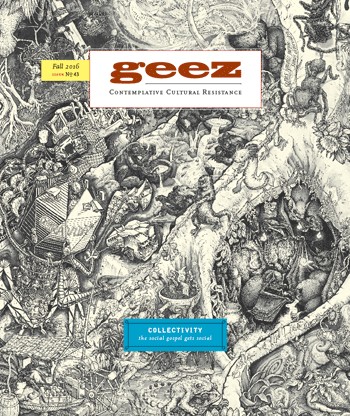My Life is Expressed in Community

Credit: Laaja Photography, https://flic.kr/p/g4ewxe
Supposing that we had produced in a human manner; each of us would in his production have doubly affirmed himself and his fellow men… In my expression of my life I would have fashioned your expression of your life, and thus in my own activity have realized my own essence, my human, my communal essence. ‒ Karl Marx
Karl Marx argues that our human essence is relational: to truly “realize ourselves” is to work for the human community. But, he says, we can only begin to do this when we are freed from an economic system in which our success depends on producing more and better than our neighbours.
By renouncing competition and wealth accumulation, one may indeed go some distance toward becoming more relational, and this may certainly feel freeing and authentic, especially at the beginning.
In 2014, after years of hesitation, I finally took the leap into monastic life. Over a period of weeks, with a sort of feverish, reckless joy and abandonment, I gave away all my stuff and prepared to launch myself wholeheartedly into a new quest for God, shared in all its details with other people. I became simultaneously utterly free and utterly dependent on others.
But to really find that community is our “essence,” as Marx says ‒ to really find others at the heart of who we are, and to make this the centre of our life ‒ seems to require more work than merely renouncing private property. From my own experience, and from speaking to others who have made similar choices, it seems common to find that the exhilarating freedom experienced in the first moment is bound to be followed sooner or later by feelings of confinement. Granted, I’m an “old monastic” (in my form of community), and our life of poverty, chastity, and obedience makes especially strong demands on our personhood. We renounce personal income, we give over the direction of our work to the community, we commit to eat the same things at the same times, to talk only at certain times and in certain places, to be present at three daily liturgical offices and a host of other activities.
But all of that external change doesn’t make our competitiveness, or our drive for freedom of choice and self-direction, just disappear, as Marx seems to hope: it doesn’t automatically liberate us to become fully communal beings. Myself, I am artistic, creative, and intellectual. My communal heart is combined with an isolating set of natural predispositions. I like working alone, and the kind of work I do best is not obviously useful to anyone. To top it off, I dislike committees and meetings, and making group decisions. I am decidedly uninterested in most of the details of community life.
But nevertheless, my life is evolving such that the “expression of my life” is beginning to contribute to the expression of the life of my community and the human community. I am living in a way that I would never have been even imagined, let alone accomplished, by myself.
These days I am a habited nun who, in recent months, has taught political philosophy at McGill, translated French monastic works into English, and wrote funding proposals for an international development organization. I cook for a crowd of people twice a week, I knock on back-alley doors for free bread, I learn the violin, I sell people’s rejected knickknacks to other people who are happy to have them. All of this is done to serve my community, but I am happy to do it and I see the fulfillment of who I have always been in this.
So how do we get there, to this unity between the expression of our life as individuals and the expression of the life of the community? This requires a revolution not only in our external circumstances, but also a conscious and continual reorientation of our lives around something that can keep us going and keep us together even on those days when we absolutely can’t work or live together (when relationality falls apart), or when feel like there is no room for our individual gifts to be realized (when our sense of personal fulfillment falls apart). I have endured many dry months when I didn’t see the sense of what I was doing, when my life seemed to be nothing but cooking and cleaning and meetings.
But I am committed to this project that is bigger than we are, to carrying out this expression of God’s love for the world. This puts my drives for personal fulfillment and for community into balance. Our life is a process of opening ourselves to the love that wants to be incarnate in us collectively, that draws each of us into a wholeness that is humanly impossible. What transforms the expression of my life into the expression of your life is when we allow ourselves to become the expression of God’s life in us.
Soeur Aimée is a novice with the Fraternités Monastiques de Jérusalem in Montreal. Her doctoral thesis in philosophy, “Authenticity and the Ascetic Self” (under the name Amy Barnes), which addresses similar themes, can be accessed through the National Library online archives. What helps her identify less as an individual and more as a member of a group is singing Compline amongst the community of sisters in their oratory.



Sorry, comments are closed.